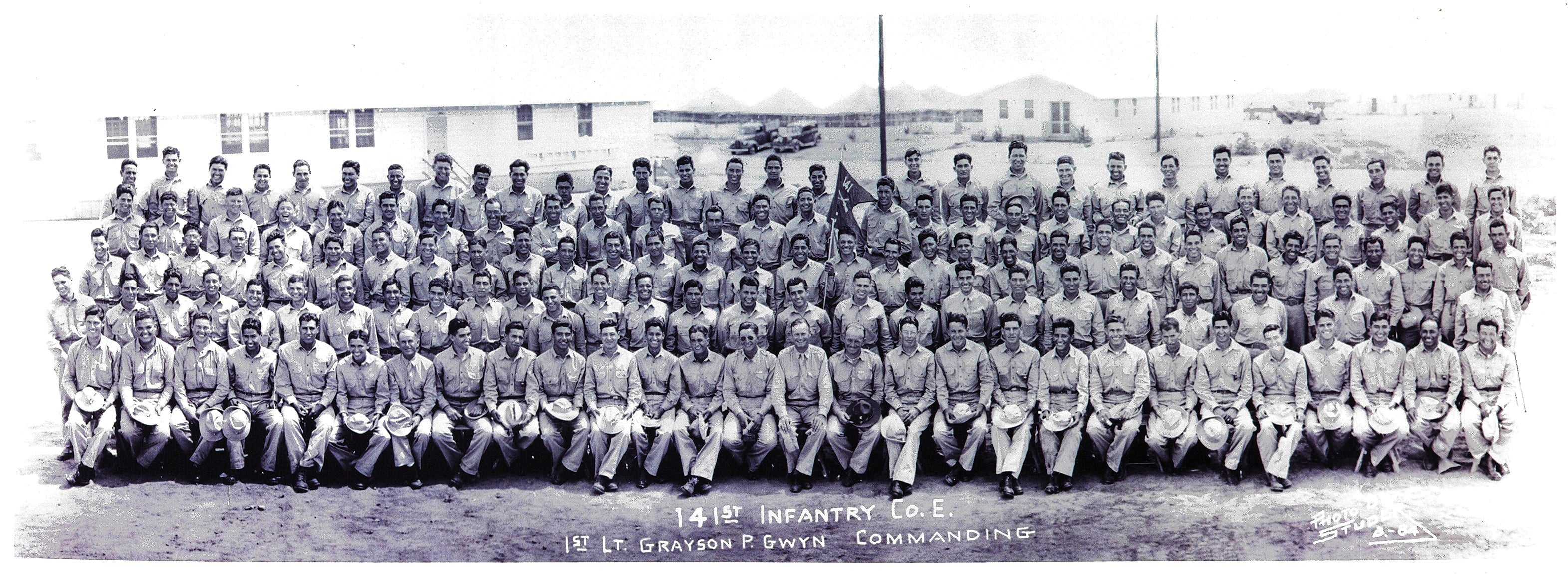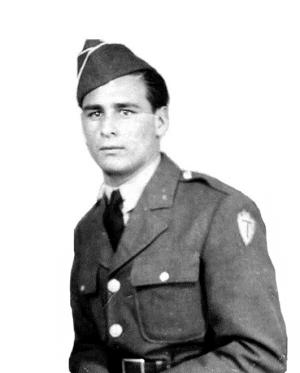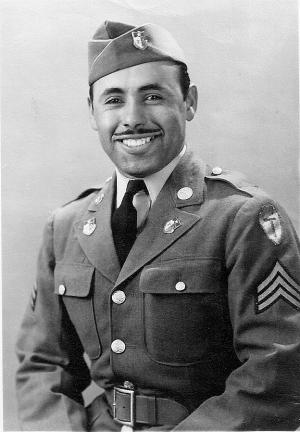History often takes its time to uncover our nation’s unsung and extraordinary military groups. It is only sometimes through the efforts of dedicated pioneers that these stories are excavated from the trenches of battlefield folklore. The story of the all-black Tuskegee Airmen has been featured in books and film. The all-Japanese U.S. Army 442nd Regiment has also seen its story showcased in books and film. However, while Latinos were awarded more Medals of Honor per capita during World War II than any other minority group, their stories have remained in the shadows.
Three trailblazing individuals seek to reverse this course and introduce our society, and even the world, to a little-known Army National Guard World War II company from El Paso, Texas—the men of Company E of the 141st Infantry Regiment, 36th Infantry Division. Authors Dave Gutiérrez, Samuel S. Ortega and Arnulfo Hernández Jr. changed the historical trajectory when a couple of years ago they authored books about the largely untold unit. In 2014, Gutiérrez’s book, Patriots from the Barrio, was released. In 2015, Ortega and Hernández co-authored The Men of Company E: Toughest Chicano Soldiers of World War II. These seminal books chronicle the story of the men who served in the all-Mexican-American combat unit.
Gutiérrez, who first set out to write his relative Ramon Gutiérrez’s biography, said, “When I learned that Ramon had served in an all-Mexican-American World War II unit, the focus of the story changed from telling one man’s story to the entire unit’s story.” The authors dedicated years of historical research and used genealogy methods and/or personal-outreach interviews to connect with over 60 families of the men who served in the unit.
An original National Guard unit, Company E was federalized in November 1940 and moved to Camp Bowie in Brownwood, Texas. In January 1941, young Mexican-American recruits from the barrios of south Texas were assigned to Company E.
The unit remained an all-Mexican-American unit until it deployed to North Africa in April 1943. Gabriel Salazar, an original member of the company, would later say, “When you heard roll call, you would think we were a garrison in the Mexican Army from Juárez just across the border.”
While in North Africa, the 36th Division was assigned to the Fifth Army under Gen. Mark Clark. On Sept. 9, 1943, the 36th spearheaded the Allied invasion of the Italian mainland at Salerno. It became the first American unit to fight Hitler’s forces on the European continent.
Battlefield Heroism
Pfc. Ramon Gutiérrez from Del Rio, Texas, and his platoon had been pinned down by four German Mark IV tanks and fire from a machine gun nest. After witnessing members of his unit killed, Gutiérrez charged the machine gun nest firing his Browning Automatic Rifle until it was shot out of his hands. Although wounded, he continued to advance on the German machine gun position. He closed in and tossed a grenade into the machine gun nest. The blast killed three enemy soldiers. Gutiérrez then jumped into the nest and killed a fourth enemy soldier with his knife. For his actions at Salerno, Gutiérrez would be awarded the Silver Star. The Soviet Union, which had an observer at Salerno, would also present the Order of Patriotic War, 2nd Degree, to Gutiérrez.
Sgt. Rafael Q. Torres of El Paso led his squad at the Salerno beachhead. Torres was one of six Torres brothers serving in the armed forces during the war. Torres’ squad was also stopped by German armor when he fought off several German tanks with a grenade launcher and a Springfield rifle. Torres was wounded in the shoulder attempting to care for a wounded Marcelino Valadez, also from El Paso.
The bitter fighting on the Salerno beaches lasted for days until German forces pulled back from the beachhead to the Volturno River, just north of Naples. Company E would continue to see action in some of the most brutal battles of the Italian Campaign.
Hard Fighting
Company E fought at Mount Rotondo, at the battle for the village of San Pietro and the disastrous Rapido River crossing. In a span of 48 hours, the 36th would lose over 2,000 men in the failed attempt to cross the Rapido at the heavily defended German Gustav Line.
Of the 154 men of Company E that crossed the Rapido in January 1944, only 27 returned from across the river.
Those who survived the Rapido crossing would continue on and fight at Monte Cassino. Company E had a ringside seat to the bombing of the 6th-century monastery high above Monte Cassino. For months, Allied forces believed the Germans were using the St. Benedict Monastery as an observation post. The order was finally given and on Feb. 15, 1944, Allied bombs destroyed the monastery, with Company E dug in on the slopes of Mount Castellone.
Some of the men continued on to see action at Anzio and Velletri and would enter the “Eternal City” of Rome. A few more would also make the landing in southern France during Operation Dragoon. Author Dave Gutiérrez said, “They came from places like Del Rio, Uvalde, Sonora, Kingsville and El Paso, Texas, and I didn’t want these men and their sacrifices to be forgotten. These soldiers and their families served this nation when their country needed them the most. They were true American patriots who happened to come from the barrios of Texas.”
Rights Acquired
The film and TV rights to Gutiérrez’s book were recently acquired by Hollywood actor/producer Wilmer Valderrama’s production company. Valderrama, who was a cast member on the TV sitcom That 70’s Show, said last fall, “During Hispanic Heritage Month, this story is especially timely, and I’m honored as a proud Latin American to amplify the courage and contributions of these incredible men.”
Author Hernández said, “We hope that as the story unfolds that people begin to appreciate their story, and we hope we can inspire the younger folks, the new writers, to look into their history. We hope we can at least be an instrument where young folks not only can feel the pride in their heritage, but want to explore it.”
The all-Mexican-American World War II unit now joins a select few minority veteran groups that endured unique obstacles and challenges to rise above adversity. For instance, in 2014, then-President Barack Obama awarded the Congressional Gold Medal, which parallels the Presidential Medal of Freedom as the nation’s highest civilian award, to the U.S. Army’s 65th Infantry Regiment “Borinqueneers” after an aggressive nationwide grass-roots effort. The Borinqueneers originated from Puerto Rico in 1899 and it was the only Regular Army Hispanic segregated unit whose military exploits pinnacled during the Korean War.
Company E, 141st Infantry Regiment, 36th Infantry Division, will assuredly continue to be woven into the fabric of our culture and enshrined in the annals of American history.




